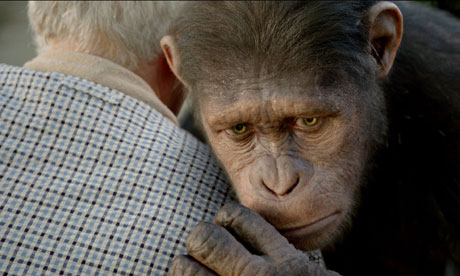
In the final scene of the 1968 sci-fi classic Planet of the Apes, Charlton Heston's protagonist discovers the devastating truth about his situation. He is not, as he had supposed, trapped in another galaxy, but here on post-apocalyptic Earth, where the human race has engineered its own destruction through catastrophic nuclear war. This summer, the release of a much-anticipated prequel to the franchise, Rise of the Planet of the Apes, offered an altogether more contemporary explanation for the fall of mankind and consequent simian ascendancy: not an arms race but the quest to discover a drug cure for Alzheimer's disease.
I don't think it's glib to impute real significance from the fact Alzheimer's is now turning up as a plot device in Hollywood blockbusters, albeit one loaded with as much desolation as hope. Privately, thousands of families in Britain – including my own – are affected by dementia each year: an ineluctable consequence of living longer. That it should leak into popular culture is no surprise: over the past decade dementia has been the subject of chick-lit and literary memoir, as well as storylines in Coronation Street and the Archers. Julie Christie was Oscar-nominated for her portrayal of a wife with Alzheimer's in the 2006 film Away From Her; this year alone it has been central to two prime-time BBC dramas: Exile and The Shadow Line.
But it is the particular character of this condition – its merciless assault on memory, the locus of selfhood and our connection with others – as much as its prevalence that renders it compelling in fiction and so dreaded in reality. People fear dementia more than cancer and even more than death, according to a poll undertaken earlier this year.
To clarify, dementia is not a disease itself but a set of symptoms for which Alzheimer's has become a shorthand. And, although Alzheimer's accounts for two-thirds of the 820,000 people affected in the UK today, other common causes include vascular dementia and frontotemporal dementia, while it is possible to have more than one of these diseases at the same time. While age remains the main risk factor in developing the condition, it is pathological, not an inevitable part of growing older. The consequences are far removed from endearing dottiness, or self-deprecating '"senior moments" commonly and cosily associated with an ageing mind.
Those working in the sector contend that, in terms of public awareness, research and funding, it remains 30 years behind a disease of similar social impact. Cancer research received £590m funding last year, compared to the £50m devoted to dementia, despite a study finding that the economic effect of dementia was greater than that of cancer and heart disease combined.
Perhaps this time lag will give the media the opportunity to employ a little more nuance, thus avoiding the usual panic-blame approach evident in the reporting of atypical tales of younger onset and faddy avoidance tactics, or the way that breast cancer, for example, has been surreptitiously reframed by some as a "lifestyle" disease disproportionately affecting childless women with stressful careers. Although cohort studies of dementia do find strong links to heart health and lower cholesterol, the jury remains on permanent leave when it comes to the likes of coffee, oily fish or those brain-training gadgets that the actor Nicole Kidman is so keen on.
While research is currently focused on developing an accurate means of early detection – which would then allow treatments to be usefully tested – campaigners underline that we can best learn from those directly affected. Since his diagnosis in 2007, Terry Pratchett has been a notable advocate, attempting to overturn the passivity so often associated with dementia. Likewise, the organiser of the first global Dementia Awareness Day, which took place earlier this month, Norman McNamara, blogs regularly about his condition. His latest post is painful to read:
"Can you imagine waking up in a morning and being told you were stood there in the middle of the night, demanding to go home?… It's horrifying having all that time, all that emotion and all those memories, gone, lost and banished forever to who knows where? It feels like I have an empty space inside my head that I want more than anything to fill with memories lost, good or bad. Being told I have done these things over the last few days is like someone taking a part of me away and throwing it into an abyss which can never be recovered."
In her prize-winning account of her mother-in-law's experience of Alzheimer's, Keeper, Andrea Gillies argues that dementia remains ill-understood and so stigmatised that the government is failing to tackle it with the same urgency as it does with other, more presentable, illnesses. Dementia, associated as it is with the unglamorous process of ageing, commands little respect as a condition. The latest Thomson Reuters Evidence report found that for every research scientist working on dementia, six work on cancer. Gillies challenges too the widespread misconception that dementia is "a good way to go, a kind state of absentness that blinds the sufferer to the relentless decline towards death".
It is notable that those who talk publicly about the embarrassment, frustration and hurtfulness of caring for a parent or partner with dementia are suspected of exploiting their loved one's frailty – as John Bayley was when he wrote about his wife Iris Murdoch's decline. There is something uniquely vulnerable about a person with dementia. But memory also exists at the core of families, and its obliteration affects them uniquely, shredding their most intimate bonds and posing the cruellest of questions about what kind of care we expect to give and – ultimately – to receive.

